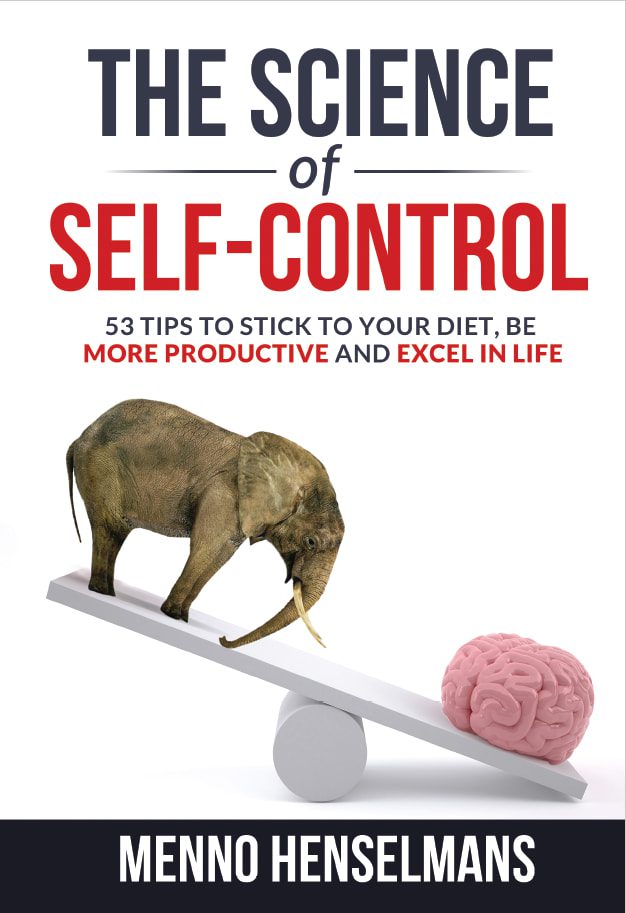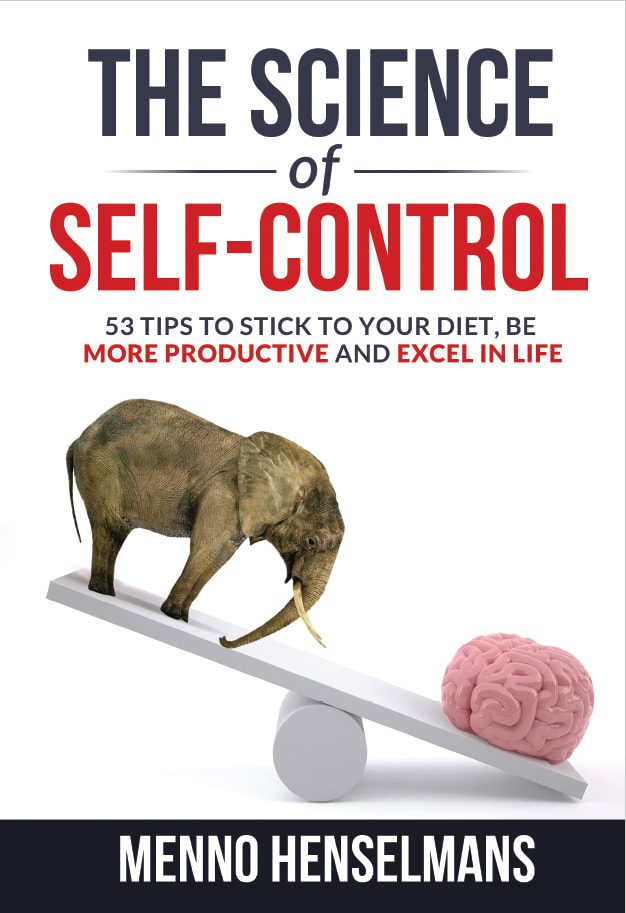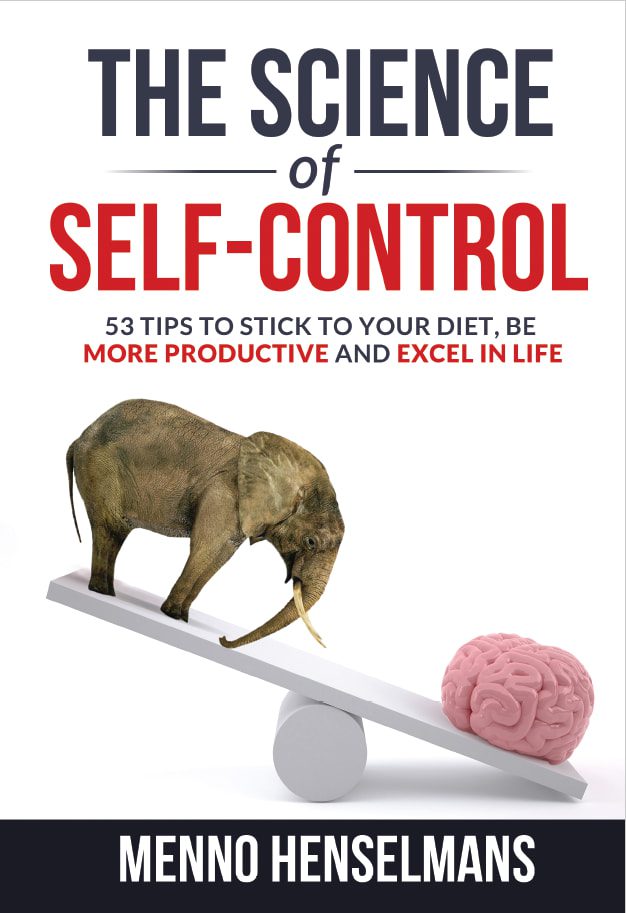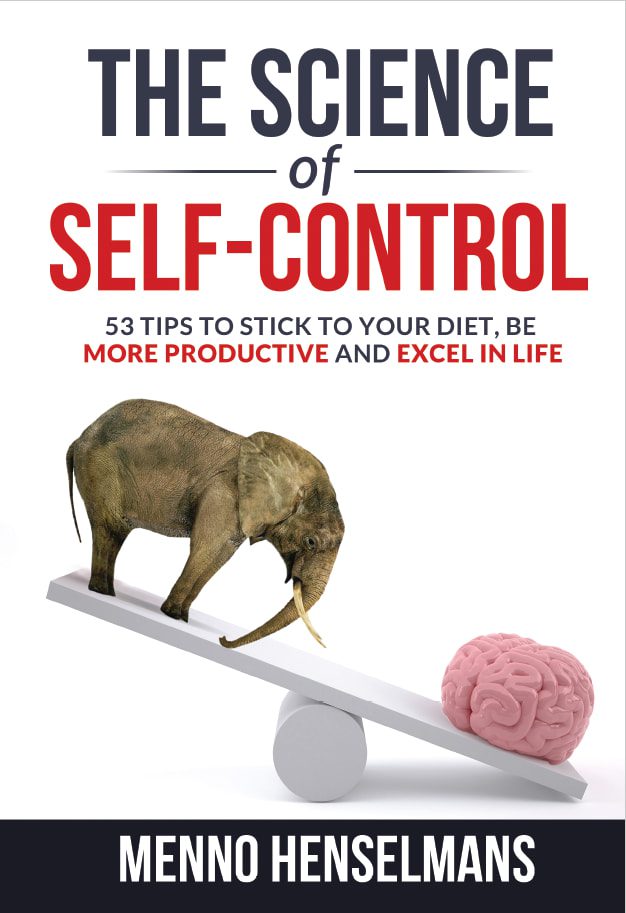"If you end up integrating all the tips in this book on how to get things done, you'll become an unstoppable version of yourself."
- Mike Israetel, PhD, professor & professional athlete
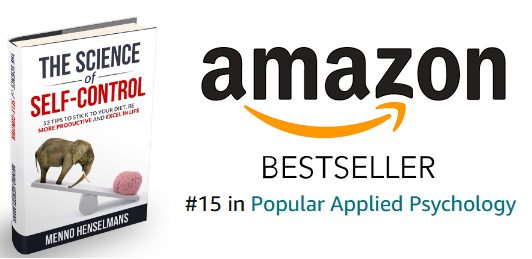
Have you ever intended to stick to your diet but ended up microwaving a pizza?
Have you ever intended to get to bed early but ended up seeing your laptop clock hit 2:00 AM?
Then I have good news and bad news.
The bad news is you lack self-control.
The good news is you're human.
My goal with this book is to make you superhuman.
Inside you'll learn how to take control of your body and mind by drawing on cognitive neurosciences and behavioral psychology.
Afterwards, you'll have higher work productivity, better diet adherence and ultimately more success in life.
Your brain isn’t designed for the modern world
For thousands of years, humans survived by seeking immediate rewards and avoiding immediate threats.
Our brains evolved to grab food when it was available, rest when we could, and avoid anything that required unnecessary effort.
But now you’re supposed to resist the donut, work on boring spreadsheets for hours, and exercise instead of watching Netflix.
You’re trying to fight millions of years of evolution, so it’s no wonder you can’t win!
That’s why to win you have to stop fighting against your brain, and work with it in the way that it understands.
The Science of Self-Control
$9.99

What the research reveals
Rated 4,6/5 by 234+ Amazon users
Here's what you'll discover inside
Why willpower keeps failing you:
- The "nocebo effect" that's secretly sabotaging your efforts
- Why "trying harder" can actually make things worse
- How to develop an indomitable will that never breaks
How to become unstoppably productive:
- The 90-minute attention rule that elite performers swear by
- Why multitasking destroys your brain and what to do instead
- How to schedule your work for maximum productivity
- The "implementation intention” technique that doubles follow-through
How to stick to any diet without suffering:
- Why mental energy has nothing to do with physical energy
- The "umami preload” strategy that improves self-control
- How to stop food cravings using mindfulness and future thinking
- Why flexible control beats rigid dieting every time
How to make exercise feel effortless:
- Why training muscles more frequently reduces perceived effort
- How to use caffeine strategically without building tolerance
- Why heavy weights are actually less effortful than light weights
- The right music and drink choices that reduce mental fatigue
How to build motivation that never runs out:
- The growth mindset that separates achievers from everyone else
- How to cultivate competence, autonomy, and relatedness
- Why competence is more motivating that just enjoying something
- How purpose makes discipline unnecessary
Plus 38 additional science-backed strategies.
They cover everything from optimal sleep timing to grocery shopping psychology, even including how to write your grocery list (yes, it matters).
If I could go back and give my younger self one book, this would be the one by a longshot.
Whoever is reading this, do yourself a favor and pick-up this book.
Jordan Galida // Competitive powerlifter & bodybuilder
This book by Menno has been the best book I have read all year. The takeaways and tips for being productive have already been implemented into my daily routine.
I feel like I have all the tools and knowledge necessary to make sustainable lifestyle changes.
Amazon customer
I have read a lot of "self help" books, and I can honestly say this is one of the best I have read.
Too many self books are devoid of effective information, serving less as a conduit of learning and more of a flagrant self promotion of ones brand.
This book breaks that trend by having effective, research-backed information that helps one make improvements in a short time.
Mathew Denton
Rated 4,6/5 by 234+ Amazon users
These strategies work because they're designed to work with your brain's natural tendencies, not against them
Instead of fighting your instincts, you'll learn to redirect them toward your goals.
It's the difference between swimming upstream and swimming with the current.
Most people keep trying approaches that have failed them before. They spend hundreds on personal trainers, productivity courses, and diet programs that ignore psychology and rely on motivation instead of giving you concrete tools to succeed.
Just 30 days from now, you could:
- Actually follow through on your Monday plans, every single week.
- Make healthy eating happen nearly automatically.
- Turn exercise into something you look forward to.
- Stop beating yourself up for being "lazy" or "undisciplined".
How would you like to enjoy the book?
Hardcover
59.99 USD*
29.99 USD*
*: Amazon is in control of the price, so it may differ over time and per marketplace.
eBook
19.99 USD
eBook Bundle: PDF, EPUB & MOBI [USD]
Paperback
39.99 USD*
19.99 USD*
*: Amazon is in control of the price, so it may differ over time and per marketplace.
Audiobook
MP3 file; 19.99
MP3 file; 9.99 USD
Zero risk guarantee
I'm so confident the strategies in the book will work for you that I'm offering a complete 30-day money-back guarantee.
Download the book. Try out the strategies.
If you don't see real improvements in your productivity, diet adherence, or self-control within 30 days, just email me. I'll refund every penny. No questions asked. No hoops to jump through. You keep the book either way.
Satisfaction
Guarantee
Table of contents
Introduction
Chapter 1: 2-system theory
Chapter 2: thy will be done
Chapter 3: how to be more productive
Chapter 4: how to stick to your diet
Chapter 5: how to make exercise less effortful
Chapter 6: how to motivate yourself
Afterword
References

Menno Henselmans
Menno Henselmans is a former business consultant turned international public speaker, scientific researcher and educator. His works have been published in over a dozen languages and his website was ranked the #1 fitness website by The Huffington Post.
I’ve always been particularly interested in 3 things: fitness, happiness and productivity.
Since I graduated in behavioral economics at Warwick with a Master’s degree with distinction, I’ve always been particularly interested in 3 things: fitness, happiness and productivity.
This book ties those 3 topics together under the overarching theme of willpower with a no BS approach. My tips are very practical and as concrete as possible.
Not your typical self-help vague advice like: “Be more positive.” I tell you how to organize your day, how to build good habits and how to break bad ones; I even go into how to write your grocery list (yes, it matters).
If you care about your diet, your productivity or your wellbeing in general, I’m confident this book will add value to your life. In fact, I believe objectively this book is easily worth over a thousand dollars. Just calculate it.
If the productivity advice alone increases your average lifetime income by 3%, over the next 20 years that’s a net gain of 18.000 dollars on a 30k yearly income.
Not to mention the value of being leaner, having less stress over your diet and being happier.
Honestly, what are you still doing reading this page? Go read my book!
Rated 4,6/5 by 234+ Amazon users
Top reviews

This book is an easy to digest format of fundamental concepts to improve every day living for the fitness, health and well-being enthusiast. Menno breaks down concepts that are functional and practical to “hack” your brain and create long lasting impact in multiple areas of life, backed by science. Great purchase!
Thank you for writing this book. Full of super useful tips, very well written, references to studies. I learned a lot, both about food behavior and training. A lot of myths have been gently eliminated and reviewed in a concrete way. I will apply many of these tips very quickly. I'm already hoping for a 2nd book from Menno... maybe more focused on sport, training techniques. This book is a must-have.
Always been a huge fan of all Menno's (fee) online training-and nutrition related work but this book is something else. All the science based tips and tricks will definitely make my life even better.
I first heard of Menno years ago via Jeff Nippard. But it was only through his recent appearance on the modern wisdom podcast that I realised how multifaceted his knowledge was, and how intelligent his approach to other things than fitness is.
Really glad I found this book, it’s been the most actionable I’ve read in years.
Frequently asked questions
These strategies work regardless of your age, background, or how many times you've "failed" before. The science applies to everyone because we all have the same basic brain structure. Whether you're a busy parent, overwhelmed executive, or college student, these principles work because they're based on how human psychology actually functions.
Absolutely not. This book contains insights from 542 scientific studies -- hard research from neuroscience, psychology, and behavioral economics. Every strategy is backed by peer-reviewed research. You won't find any "just believe in yourself" nonsense here, only proven techniques that work
You'll get instant access to PDF, EPUB, and MOBI formats, so you can read on any device—phone, tablet, computer, or Kindle. The download links are sent immediately after purchase.
The physical version is available on Amazon for $19.99-$29.99 depending on your region and doesn't always include shipping costs. You can get the eBook on this page for just $9.99
Yes, it's very simple. After purchase, you'll receive an email with download links. Just click and save the files to your device. If you can send an email, you can access this book.
Many strategies provide nearly-immediate benefits. You can implement techniques like the 90-minute attention rule or "umami preload" right away. For lasting habit changes, most people can see significant improvements within 2-4 weeks of consistent application.
Yes. I have a Master's degree in Behavioral Economics from the University of Warwick and spent over 3 years researching this topic. Every strategy is backed by peer-reviewed research from leading universities and scientific journals. The book includes 542 scientific references.
"If you end up integrating all the tips in this book on how to get things done, you'll become an unstoppable version of yourself."
- Mike Israetel, PhD, professor & professional athlete
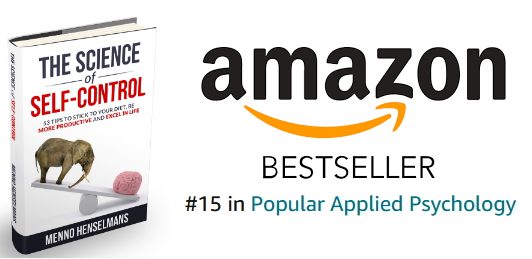
Does this sound familiar?
It's Sunday night and you're getting ready for the perfect week.
You'll meal prep on Monday.
You'll finally finish that important work project.
You'll start the new workout routine you've been meaning to do for months.
And you'll stop mindlessly scrolling on your phone.
But then you blink and it's Wednesday.
You're ordering takeout, procrastinating on Instagram, and wondering what's wrong with you.
I have good news and bad news.
The bad news is you lack self-control.
The good news is you’re human.
The Science of Self-Control
$9.99
Most people struggle with this conflict
between their primal instincts and conscious will
- They start every Monday with the best intentions, but by Wednesday they’re back to old habits.
- They download productivity apps and make detailed plans, but somehow end up watching Netflix instead of working.
- They promise themselves "just this once" when it comes to food, but keep breaking their own rules over and over.
- They feel motivated after reading success stories, but can’t seem to replicate their discipline.
- They beat themselves up for "lacking willpower" while watching others effortlessly achieve their goals.

This is a self-reinforcing loop of failure.
Every time you "fail", it chips away at your confidence. You start believing you’re just not the type of person who has self-control.
You’re not disciplined enough. Not strong enough. Don’t have enough willpower.
But these failures have nothing to do with weakness and everything to do with the way your brain works.
Your brain isn’t designed for the modern world
For thousands of years, humans survived by seeking immediate rewards and avoiding immediate threats.
Our brains evolved to grab food when it was available, rest when we could, and avoid anything that required unnecessary effort.
But now you’re supposed to resist the donut, work on boring spreadsheets for hours, and exercise instead of watching Netflix.
You’re trying to fight millions of years of evolution, so it’s no wonder you can’t win!
That’s why to win you have to stop fighting against your brain, and work with it in the way that it understands.
But how do you do that?
I have spent more than 3 years researching this exact question. I dove deep into behavioral psychology, neuroscience, and cognitive studies to understand what actually works.
Not what sounds good in theory, but what produces real results.
After analyzing 542 scientific studies and testing these principles myself and with my clients, I discovered something remarkable:
The people who consistently achieve their goals aren't more disciplined. They aren't stronger-willed.
They simply understand how to work with their brain's design instead of against it.

Hi, I'm Menno Henselmans.
Rated 4,6/5 by 234+ Amazon users
Here's what you'll discover inside
Why willpower keeps failing you:
- The "nocebo effect" that's secretly sabotaging your efforts
- Why "trying harder" can actually make things worse
- How to develop an indomitable will that never breaks
How to become unstoppably productive:
- The 90-minute attention rule that elite performers swear by
- Why multitasking destroys your brain and what to do instead
- How to schedule your work for maximum productivity
- The "implementation intention” technique that doubles follow-through
How to stick to any diet without suffering:
- Why mental energy has nothing to do with physical energy
- The "umami preload" strategy that improves self-control
- How to stop food cravings using mindfulness and future thinking
- Why flexible control beats rigid dieting every time
How to make exercise feel effortless:
- Why training muscles more frequently reduces perceived effort
- How to use caffeine strategically without building tolerance
- Why heavy weights are actually less effortful than light weights
- The right music and drink choices that reduce mental fatigue
How to build motivation that never runs out:
- The growth mindset that separates achievers from everyone else
- How to cultivate competence, autonomy, and relatedness
- Why competence is more motivating that just enjoying something
- How purpose makes discipline unnecessary
Plus 38 additional science-backed strategies.
They cover everything from optimal sleep timing to grocery shopping psychology, even including how to write your grocery list (yes, it matters).
If I could go back and give my younger self one book, this would be the one by a longshot.
Whoever is reading this, do yourself a favor and pick-up this book.
Jordan Galida // Competitive powerlifter & bodybuilder
This book by Menno has been the best book I have read all year. The takeaways and tips for being productive have already been implemented into my daily routine.
I feel like I have all the tools and knowledge necessary to make sustainable lifestyle changes.
Amazon customer
I have read a lot of "self help" books, and I can honestly say this is one of the best I have read.
Too many self books are devoid of effective information, serving less as a conduit of learning and more of a flagrant self promotion of ones brand.
This book breaks that trend by having effective, research-backed information that helps one make improvements in a short time.
Mathew Denton
Rated 4,6/5 by 234+ Amazon users
Of course you don’t have to implement all of these strategies in your life
Even if you only implement a fraction of it, just 30 days from now:
- You could actually follow through on almost all of your Monday plans, every single week.
- Work can feel focused and energizing instead of draining and scattered.
- Healthy eating can happen nearly automatically.
- Exercise can become something you look forward to instead of something you dread.
- You can stop beating yourself up for being "lazy" or "undisciplined".
- And you can join the small percentage of people who consistently achieve their goals.
Why do these strategies work when everything else fails?
They're designed to work with your brain's natural tendencies, not against them.
Instead of fighting your instincts, you'll learn to redirect them toward your goals.
It's the difference between swimming upstream and swimming with the current.
Most people take the exact opposite approach.
They keep trying the same approaches that have failed them before.
They spend $100s on personal trainers, productivity courses, therapy, and diet programs that ignore psychology and rely on motivation instead of giving you concrete tools to succeed.
None of them address the root cause of how your brain actually works.
They treat the symptoms. Not the cause.
This is why I believe this book is easily worth over a thousand dollars.
Just calculate it.
If the productivity advice alone increases your average lifetime income by 3%, over the next 20 years that's a net gain of 18,000 dollars on a 30k yearly income.
Not to mention the value of being leaner, having less stress over your diet and being happier.
How would you like to enjoy the book?
Hardcover
59.99 USD*
29.99 USD*
*: Amazon is in control of the price, so it may differ over time and per marketplace.
eBook
19.99 USD
eBook Bundle: PDF, EPUB & MOBI [USD]
Paperback
39.99 USD*
19.99 USD*
*: Amazon is in control of the price, so it may differ over time and per marketplace.
Audiobook
MP3 file; 19.99
MP3 file; 9.99 USD
Zero risk guarantee
I'm so confident the strategies in the book will work for you that I'm offering a complete 30-day money-back guarantee.
Download the book. Try out the strategies.
If you don't see real improvements in your productivity, diet adherence, or self-control within 30 days, just email me. I'll refund every penny. No questions asked. No hoops to jump through. You keep the book either way.
Satisfaction
Guarantee
Table of contents
Introduction
Chapter 1: 2-system theory
Chapter 2: thy will be done
Chapter 3: how to be more productive
Chapter 4: how to stick to your diet
Chapter 5: how to make exercise less effortful
Chapter 6: how to motivate yourself
Afterword
References
Where will you be six months from now?
Will you be six months closer to your goals, or six months deeper into the same frustrating patterns?
Most people choose to stay stuck because changing feels hard. But you're reading this, which means you're not most people. You're someone who's ready to join the small percentage who actually follow through.
Two types of people will read this.
Type 1: Will think "This sounds interesting" and then scroll to something else. They'll bookmark this page "for later" and never come back. Six months from now, they'll still be stuck in the same cycle of broken promises.
Type 2: Will recognize this as exactly what they've been looking for. They'll get the book, start implementing the strategies, and 30 days from now they'll be living proof that these methods work.
Which type are you?
Rated 4,6/5 by 234+ Amazon users
Top reviews

This book is an easy to digest format of fundamental concepts to improve every day living for the fitness, health and well-being enthusiast. Menno breaks down concepts that are functional and practical to “hack” your brain and create long lasting impact in multiple areas of life, backed by science. Great purchase!
Thank you for writing this book. Full of super useful tips, very well written, references to studies. I learned a lot, both about food behavior and training. A lot of myths have been gently eliminated and reviewed in a concrete way. I will apply many of these tips very quickly. I'm already hoping for a 2nd book from Menno... maybe more focused on sport, training techniques. This book is a must-have.
Always been a huge fan of all Menno's (fee) online training-and nutrition related work but this book is something else. All the science based tips and tricks will definitely make my life even better.
I first heard of Menno years ago via Jeff Nippard. But it was only through his recent appearance on the modern wisdom podcast that I realised how multifaceted his knowledge was, and how intelligent his approach to other things than fitness is.
Really glad I found this book, it’s been the most actionable I’ve read in years.
Frequently asked questions
These strategies work regardless of your age, background, or how many times you've "failed" before. The science applies to everyone because we all have the same basic brain structure. Whether you're a busy parent, overwhelmed executive, or college student, these principles work because they're based on how human psychology actually functions.
Absolutely not. This book contains insights from 542 scientific studies -- hard research from neuroscience, psychology, and behavioral economics. Every strategy is backed by peer-reviewed research. You won't find any "just believe in yourself" nonsense here, only proven techniques that work
You'll get instant access to PDF, EPUB, and MOBI formats, so you can read on any device—phone, tablet, computer, or Kindle. The download links are sent immediately after purchase.
The physical version is available on Amazon for $19.99-$29.99 depending on your region and doesn't always include shipping costs. You can get the eBook on this page for just $9.99
Yes, it's very simple. After purchase, you'll receive an email with download links. Just click and save the files to your device. If you can send an email, you can access this book.
Many strategies provide nearly-immediate benefits. You can implement techniques like the 90-minute attention rule or "umami preload" right away. For lasting habit changes, most people can see significant improvements within 2-4 weeks of consistent application.
Yes. I have a Master's degree in Behavioral Economics from the University of Warwick and spent over 3 years researching this topic. Every strategy is backed by peer-reviewed research from leading universities and scientific journals. The book includes 542 scientific references.
